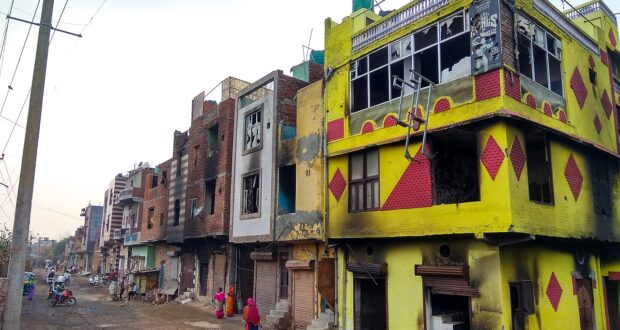4 July, 2022
Nawal Abdisamad, Global Leadership Fellow
Ever since Narendra Modi took office in 2014, his critics have argued that he has sought to implement Hinduization in India. In theory, India is a secular state and multi-ethnic democracy, but this is some way from the truth. The population in India is 1.4 billion people. Muslims, and other religious minorities make up roughly make up 20 percent of the country’s citizens, including around 200 million Muslims and 28 million Christians. In reality, underneath the country’s superficial inclusivity runs a deep-rooted undertone of Hindu nationalism that has massively gained strength during the eight-year rule of India’s Prime Minister Narendra Modi.
It is first critical to start with the history explaining the anti-Muslim tendencies and the communal violence following the 1947 partition to grasp the situation at hand. The 1947 Partition of India divided British India into two – India and Pakistan. India had a Hindu majority whereas Pakistan had a Muslim majority. Instantly, across the whole Indian subcontinent, small communities that had coexisted side by side for many years descended into acrimony. Millions were displaced and hundreds of thousands died. Since the partition, both Pakistan and India have fostered an ingrained mutual hostility and enmity, and communal violence has been rife. As a result of the Muslim-Hindu communal violence in India, around 10,000 people have been killed since the 1950s. There are a plethora of reasons why there is this violence towards Muslims: for instance, resentment and hatred towards Muslims because of the Islamic conquest of India going back to the Middle Ages.
The current leader of India, Narendra Modi, is a Hindu nationalist and former member of the paramilitary Rashtriya Swayamsevak Sangh (RSS) group. The RSS is an Indian right-wing, Hindu nationalist volunteer organization. They wish to establish a Hindu Rashtra which is a group of people that are together for the sole reason of having shared features such as language, ethnicity and history. This explains why after Modi’s re-election in May 2019, one of the first things he did with his mandate, in August of that year, was to fulfil a long-standing demand of the RSS by revoking the special autonomous status of Jammu and Kashmir, India’s only Muslim-majority territory. This political move comes in parallel to a wave of communal violence inflicted in the country’s Muslim population, as well as new laws which have interfered with aspects of their lives ranging from worship practices to who they marry.
Muslims in India have lived on the edge of economic and political life for decades, but since Narendra Modi took office in 2014, Muslims have become scapegoats for all of India’s failings. This is unfortunate because Muslims, Hindus, and Christians have coexisted for years. Discrimination has become rife. The same month he won the election, Modi’s governing Bharatiya Janata Party released a national registry that left 2 million people, many of them Muslim, off the list, resulting in their Indian citizenship being questioned. Also, another controversial policy made which The Atlantic shed light on was when Modi’s government pressed through a new law granting non-Muslims from Afghanistan, Bangladesh and Pakistan the right to seek fast-tracked citizenship in India, which explicitly discriminates against Muslims from the same countries.
Muslims in India have been facing many challenges because of their faith. Recent opinion polls published by The Print suggest that only around 65% of Hindus viewed Muslims in a positive light. The rest hold some hostility and hatred for Muslims. April this year was Ramadan, a blessed month for Muslims all around the world, but unfortunately, Muslims in India have had to witness their homes and shops being bulldozed, their hard-earned businesses being boycotted and their religious places of worship being harassed and interrupted by Hindu-nationalist mob. There have been chants calling for the death and genocide of Muslims, as well as violent clashes and lynching’s. However, police have not taken it seriously, and also sometimes join in the torment and abusing of Muslims. Furthermore, as the Atlantic also highlighted, “a recent open letter signed by more than 100 former civil servants accused the Indian government of being fully complicit in the subordination of the country’s religious minorities.”
Muslims now often don’t give each other greetings in Arabic or openly eat halal meat for fear of being identified as Muslims. There has also been a backlash against women wearing the hijab, who have had their veils removed and destroyed in front of them, and men wearing Khamis (Islamic men clothing). Even though Muslims only make up 14% of the population they are having to defend their right to live. It is a common occurrence that ‘local authorities’ are bulldozing shops and homes in Jahangirpuri, a majority Muslim area. Further, the BJP has passed a policy called ‘love jihad law’ designed to stop women changing their faith, and as such prevent Hindu women from marrying Muslim men. This has been compared to the 1935 Nuremberg laws, which banned marriages between Jews and those of “pure” German blood in Nazi Germany. It is very disturbing and worrying, for such a practice to be happening in the 21st century.
All of this is taking place now in India. However, world leaders are turning a blind eye. The economic opportunities India offers play a part in this. There are also problems that are popularly seen as more pressing, including the fallout from the Covid and Ukraine crisis. There may also be an element of prejudice given those being persecuted are Muslim. But if Muslims in India are not protected, they will remain in grave danger.
Image: Muslim homes and businesses burned during the 2020 Delhi riots (Source: Banswalhemant via CC BY-SA 4.0)
 Human Security Centre Human Rights and International Security Research
Human Security Centre Human Rights and International Security Research




